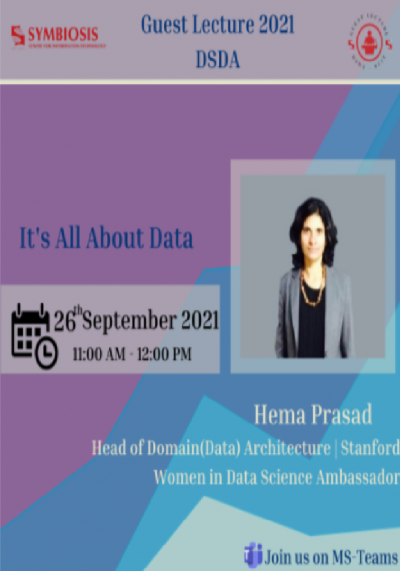It is all about data

On 26th September there was a Guest lecture on the topic: ‘It is all about Data.’ The speaker was Hema Prasad who is one of the top 10 Analytics Leaders in Australia & ambassador for Stanford women in Data Science. She has more than two decades of experience in leading large-scale data analytics transformation programs for Fortune-100 and ASX clients in USA, India and Australia.
The speaker talked about the evolution of data. In 1950s, computers had automated programs for short term data processing and even calculators were considered big achievement back then. In 1960-80, the relational data was stored in Database structures which led to the birth of SQL. In 1976, Peter Chen introduced the concept of entity-relationship modelling which had an approach of organizing and storing data in a structure. Then came the era of 1980-2005 with NoSQL database management system which offered scalability. 2020 was the era of the lakes. The lakes stores data without any processing thereby preserving the original structure of the data. They doesn’t require any relational database. Then came the concept of a lake house which uses the best property of data lakes and data warehouses.
She then emphasized on the data industry. About 163 zettabytes of data would be produced by 2025 worldwide as the amount of data being generated is increasing exponentially. Millions of jobs exist in this field, but due to the lack of desired skills, the posts remain vacant.
She explained the life cycle of data including data acquisition, processing, modelling, storing and utilizing data for information, knowledge and insights.
The raw data needs big data analytics, infrastructure security measures, business analytics and data modelling.
She gave examples of the women in tech before the birth of the internet on 6th August 1991; like Edith Clarke who invented the Clarke calculator, Ada Lovelace who is the prophet of the computer age, women of ENIAC, Sister Mary Kenneth Keller who was the first female with a PhD in computer science and Margaret Hamilton who was the programmer of Apollo landing. She pointed out how inspite of having mobile phones, laptops and even an option to work remotely many women aren’t in the tech field.
The speaker expressed her vision of a woman and shared her personal life experience. The informative session ended with question and answers.















